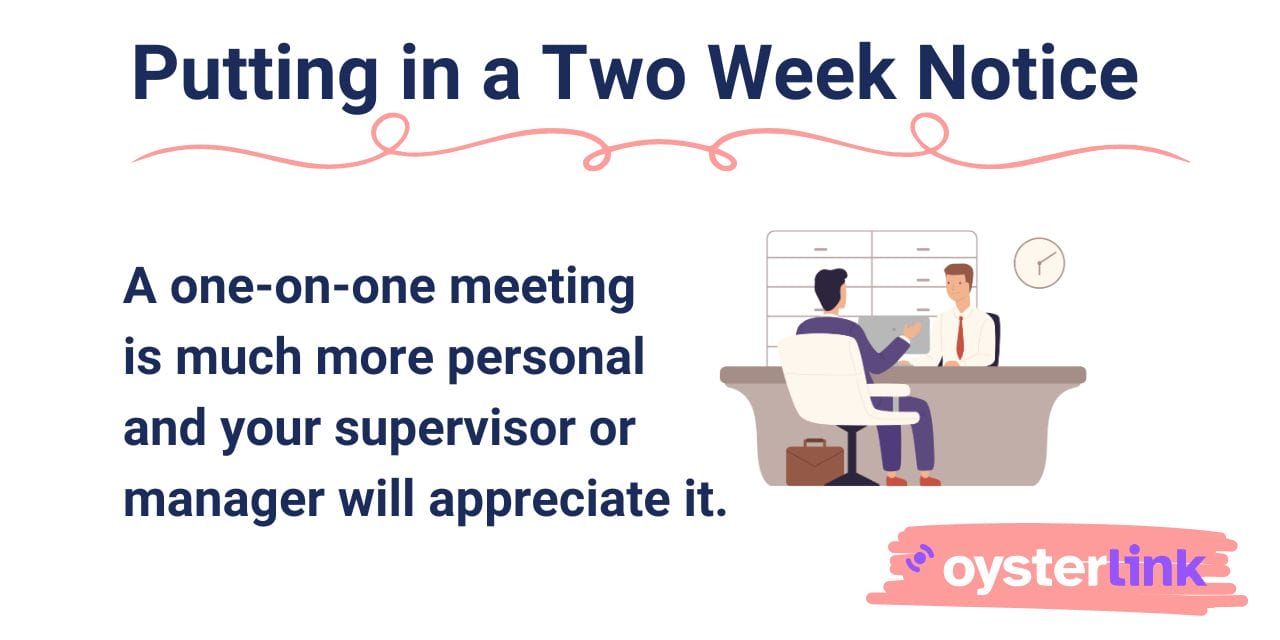How to Put in Your Two Weeks' Notice Key Takeaways:
- A Two Weeks’ Notice Reflects Professionalism: Submitting your two weeks notice the right way shows respect for your employer, preserves relationships, and safeguards future references.
- Preparation Ensures a Smooth Transition: Reviewing contracts, organizing personal items, and planning for knowledge transfer helps minimize disruptions and protects you legally.
- Positive Exit Leaves Lasting Benefits: Maintaining professionalism during your final days and beyond strengthens your reputation, expands your network, and supports long-term career growth.
If you decide to leave your job, you’ll need to carefully plan and execute the transition period. One crucial aspect of this process is knowing how and when to put in your two weeks’ notice.
This guide will walk you through the essential steps, considerations and best practices for submitting your resignation.
Remember that giving proper notice is more than just a courtesy — it's a reflection of your professionalism and respect for your current employer.
By handling this transition thoughtfully, you won’t upset your current employer or any of your colleagues. This is important in order to maintain potentially valuable future connections.
Let's see how you can navigate this important career milestone effectively.
Understanding the Importance of Two Weeks Notice
The practice of putting in a two weeks notice has become a standard in many industries, serving as a bridge between your current role and your future job.
This two weeks period allows for a smoother transition, benefiting both you and your employer.
Professional courtesy and reputation
Providing adequate notice demonstrates that you respect your employer and colleagues, leaving a positive lasting impression on them.
This goodwill gesture can ultimately result in valuable references and networking opportunities down the line.
Transition planning
For your employer, two weeks’ notice buys them valuable time to begin the process of finding your replacement or redistributing your responsibilities. It allows for knowledge transfer and helps minimize disruptions to ongoing projects.
Legal and contractual obligations
In some cases, providing notice may be more than just a courtesy. Certain employment contracts or company policies might stipulate a specific notice period. Adhering to these requirements protects you from potential legal complications or financial penalties.
Industry standards
While a two weeks notice is the general norm, some industries or senior positions may expect longer notice periods. Understanding and following these unwritten (sometimes written) rules can help maintain your professional standing within your field.
Below are some common industry standards when it comes to submitting your notice letter based on how long you've been employed with the company.
Preparing To Put in Your 2 Weeks Notice
Before initiating the resignation process, it's crucial to lay the groundwork for a smooth transition.
Proper preparation can help alleviate stress and ensure you're ready for any potential outcomes.
Confirm your new position
If you're leaving for another job, make sure you have a firm offer in writing before giving a two weeks notice.
This protects you from unexpected changes or misunderstandings with your new employer.
Review your current contract
Carefully read through your employment agreement or employee handbook.
Look for any clauses related to notice periods, non-compete agreements or other obligations that might affect your departure.
Gather personal items and information
Start discreetly collecting any personal belongings from your workspace.
Back up important personal files and contacts, ensuring you don't lose access to valuable information after your departure is announced.
Prepare for immediate dismissal
While uncommon, some companies may ask you to leave immediately upon giving notice.
Be mentally and practically prepared for this possibility, including having important personal items ready to take with you.
Crafting Your Two Weeks Notice
A well-written two week's notice letter or email serves as an official record of your intent to leave and sets the tone for your departure.
Here's how to create an effective and professional document:
Keep it concise and positive
Your letter should be brief, typically no more than a few paragraphs. Focus on expressing gratitude for the opportunities you've had and maintaining a positive tone throughout.
Begin with a clear statement of your intent to resign and specify your last day of work. For example: "I am writing to inform you of my decision to resign from my position as [Your Title], effective [Last Day of Work]."
Acknowledge the positive aspects of your time with the company. Mention specific experiences, skills gained or mentorship received that you've valued.
Offer assistance
Indicate your willingness to help with the transition process. This could include training your replacement or documenting your current projects and responsibilities.
Proofread carefully
Ensure your letter is free from errors. A polished, well-written resignation letter reflects your professionalism and attention to detail.
How to Put in Your Two Weeks Notice Professionally
The way you inform your General Manager about your decision to leave can significantly impact how your resignation is received. Here are some tips for handling this crucial conversation:
Schedule a private meeting
Request a one-on-one meeting with your direct supervisor. If you work remotely, arrange for a video call rather than relying on email or instant messaging. Your General Manager will greatly appreciate you doing it over video or voice call rather than via email or message.

Be direct and professional
Start the conversation by clearly stating your intention to resign. Avoid lengthy explanations or emotional statements. A simple, "I've decided to accept another position and my last day will be [date]" is often sufficient.
Be prepared for questions
Your manager may ask about your reasons for leaving or your future plans. Have concise, professional responses ready, focusing on your career growth rather than any negative aspects of your current job.
Discuss transition plans
Be ready to outline how you plan to wrap up your current projects and responsibilities. Offer to create a detailed transition document or train your replacement if time allows.
Handle counteroffers gracefully
If your employer presents a counteroffer, be prepared to respond professionally. If you've already accepted another position, politely decline while expressing appreciation for the offer. If you’re still on the fence and haven’t signed anything with your new employer, you can consider their offer.
Managing Your Final Two Weeks
Once you've given notice, it's important to maintain your professionalism and productivity during your remaining time with the company. Here's how to make the most of your final two weeks:
- Stay focused and productive: Continue to perform your duties to the best of your ability. Avoid the temptation to slack off or disengage from your responsibilities.
- Document your work: Create detailed documentation of your ongoing projects, processes and important contacts. This will be invaluable for your replacement or colleagues who will be taking over your duties.
- Train your replacement: If possible, offer to train your replacement directly. If no replacement has been hired, consider creating training materials or video tutorials to assist in the future transition.
- Maintain a positive attitude: Resist the urge to speak negatively about the company, your colleagues or your reasons for leaving. Maintaining a positive demeanor will help preserve professional relationships.
- Tie up loose ends: Complete any outstanding tasks or projects to the best of your ability. If you can't finish everything, provide clear status updates and instructions for completion.
Handling Workplace Relationships
Your departure will inevitably affect your relationships with colleagues and supervisors. Navigate these changes thoughtfully to maintain positive connections:
Inform close colleagues personally
After informing your manager, personally tell close coworkers about your departure. This shows respect for your working relationships and helps control the narrative of your exit.
Take time to thank mentors, supportive colleagues and team members who have contributed to your growth and success at the company. If you feel like they’d like to help you out, you can even ask some of your supervisors to write you a letter of recommendation.
For colleagues you'd like to maintain relationships with, offer to connect on professional networking platforms or exchange personal contact information.
Be mindful of office dynamics
Avoid discussing your new job excessively or comparing it favorably to your current position. This can create tension or resentment among those staying behind.
If your company conducts exit interviews, participate professionally. Offer constructive feedback if asked, but avoid using this as an opportunity to air grievances.
Preparing For Your Departure
As your last day approaches, take steps to ensure a clean and organized exit from your current role.
Clean your workspace
Remove all personal items from your desk or office. If working remotely, ensure you've backed up and removed any personal files from company devices.
Make a list of any company-owned items in your possession (laptops, phones, keys, etc.) and arrange for their return.
Update your contact information
Provide HR with your updated contact information for any post-employment communications, such as tax documents or benefits information. Ensure all work-related files are properly organized and accessible to your team. Remove any personal files from company systems.
Prepare a handover document
Create a comprehensive document outlining your current projects, important contacts and any ongoing responsibilities that will need to be transferred.
Navigating Special Circumstances
Sometimes, giving two weeks’ notice isn't straightforward. Here are some special situations you might encounter and how to handle them.
Remote work considerations
If you're working remotely, plan to have your resignation conversation via video call. Follow up with an email containing your formal resignation letter.
Dealing with a negative reaction
If your manager reacts poorly to your resignation, remain calm and professional. Reiterate your commitment to a smooth transition and avoid being drawn into arguments.
Handling immediate dismissal
If you're asked to leave immediately, remain calm and keep your composure. Ask about logistics like final pay, benefits and returning company property.
Resigning during a critical project
If you're leaving during a crucial phase of a project, offer detailed documentation and potentially extended availability (within reason) to help with the transition. For instance, if you were in charge of running a busy restaurant, you can offer to give them tips you used to manage time efficiently.
Industry-specific considerations
Some industries may have unique expectations or requirements for resignations. Research industry norms and adjust your approach accordingly.
After Your Departure
Your professional conduct after leaving can have lasting impacts on your career. Here's how to maintain your professional reputation post-departure.
- Follow through on commitments: If you offered to be available for questions after your departure, honor that commitment within reasonable boundaries.
- Update your professional profiles: Once you've officially left, update your LinkedIn and other professional profiles to reflect your new status. Be mindful of any non-compete or confidentiality agreements.
- Maintain professional relationships: Stay in touch with former colleagues and supervisors who were important to your professional growth. These connections can be valuable throughout your career.
- Reflect on your experience: Take time to reflect on what you learned in your previous role. Consider how you can apply these lessons to your new position or future career moves.
- Handle references professionally: If asked to provide a reference for a former colleague, respond promptly and professionally, offering honest and constructive feedback.
Sample Two Weeks Notice Letters
Here's a professional template you can use as a starting point for your own two weeks notice letter:
If you need more templates, we have a dedicated page with resignation letter templates that you can choose from.










Loading comments...